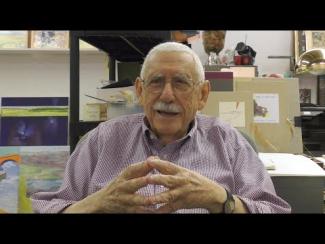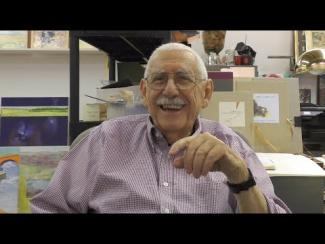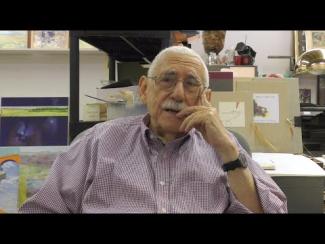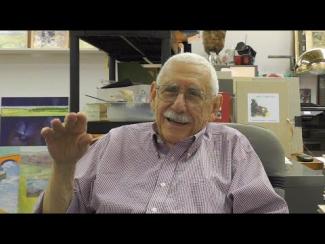The Yiddish Book Center's
Wexler Oral History Project
A growing collection of in-depth interviews with people of all ages and backgrounds, whose stories about the legacy and changing nature of Yiddish language and culture offer a rich and complex chronicle of Jewish identity.
Ed Colker's Oral History
Ed Colker, artist, designer, and teacher, was interviewed by Nina Pick on June 26, 2017 in Mt. Kisco, New York. Ed's father, mother, and grandmother emigrated to the United States from Ukraine and eventually settled in North Philadelphia. His father was a Hebraist and Zionist and his mother a fervent Yiddishist and proud union member. Ed was enrolled in the Arbeter Ring shule at eight and attended through mitlshul. He displays a composition book and photograph of a large class of students. His best friend grew up to become the well-known Yiddishist and socio-linguist Joshua Fishman. Ed reminisces about the school's emphasis on social justice and recites a poem titled "Di Noyt" [The Need]. He remembers attending a Workmen's Circle event with 5000 people in the Philadelphia Arena and standing on a street corner in a red armband collecting money for the orphans at the Medem Sanatorium in Poland. Ed sang in the Workmen's Circle choir and performed in Yiddish plays at Philadelphia Town Hall. Several friends signed up for the Abraham Lincoln Brigade to fight the Fascists in Spain. He remembers shaking hands with Norman Thomas and the portrait of Eugene V. Debs on the wall above the sideboard in his home. As part of the I.L. Peretz Youth Club, Ed put out a Yiddish newspaper and he displays the drawing of Mani Leib that he did for one of the covers. He talks about the incredible educators and education associated with the shules and some of the exceptional thinkers who came out of that environment. He talks about a Jewish sensibility and ethos separate from the religion that started in the shtetl as well as the big city. Ed is an artist, printmaker, and poet, and a retired art teacher and dean at several colleges. He has been drawing since he was a child and always knew that art was his calling. Philadelphia sent children and adolescents with specific talents to after-school programs; after that he won a scholarship to the Philadelphia Museum School. In the middle of art school, starting in 1944, he spent two years serving in the Eighty-Eighth Infantry in Italy. There he attended a seder with Jews who had been hiding in caves in Northern Italy for three years and got to spend time in museums seeing all the incredible art works in Venice. Ed returned to Philadelphia to finish art school, began teaching life drawing and joined a studio. He talks about several important projects from different times in his career. When he and his artist wife Elaine were invited to teach in Israel, he produced a book of prints illustrating Sutzkever poems in honor of the poet's 90th birthday, called "Beneath the Trees." He reads a letter from Sutzkever and recalls a visit with him at the nursing home during his last days. More recently, Ed has put together two more illustrated portfolios of Sutzkever poems about Africa. He has just completed another book titled "Twenty-three poems by Twenty-two Poets". He describes the Hayburn Press which he and his wife supported with their academic salaries to enable them to produce these beautiful books. He is pleased that the Vassar College Library is collecting his work in their archives. He is considering illustrating a book of poems by Yiddish women poets, or by women poets with Yiddish women poets highlighted. Ed wishes that more young people would participate in Yiddish activities such as the Yiddish vinkl [Yiddish corner] in a nearby temple. He is excited about the work the Yiddish Book Center is doing and wishes there was more of a Yiddish revival in Israel. He characterizes Jews as always questioning, always arguing with Hashem. The interview ends with Ed not feeling comfortable giving advice because young people today, growing up in such a different and highly technological world, will have to find their own way.
This interview was conducted in English.
Ed Colker was born in Philadelphia, Pennsylvania in 1927.






